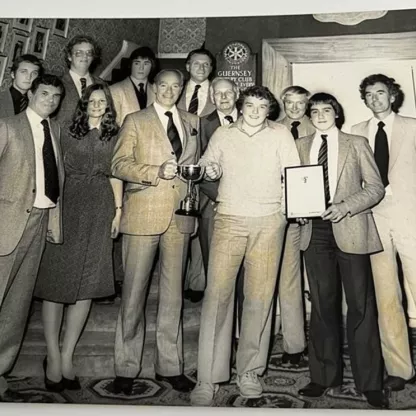A busy spring of AGMs has engagement analyst Jenny Twigg ready for a holiday. Before she heads off in search of sun, she explains why it pays to hear someone out before leaping to conclusions.

Weather to vote?
The sunshine looks like it’s here to stay! Oh wait, here come the clouds, and the pouring rain. Well, it wouldn’t be the UK if we weren’t complaining about the weather somehow. I’m furiously checking BBC Weather each morning to decide what to wear. The only constant seems to be that whenever I wear my summeriest gear, the sun decides to hide…
As an organised person who’s got used to the predictability of four seasons a year, it’s been a bit of a challenge to accommodate another one in my calendar: the Annual General Meeting (AGM) season. That’s the one time each year when shareholders get the opportunity to vote on whether they approve or disapprove of the way large, publicly traded companies are run. As the flurry of emails has started to quieten down, I realise I’ve learned through the busyness to be more be accommodating and just to smile when the sun is shining (and there’s a quiet day of votes).
AGMs can get heated. There were notable shifts in how some US companies are approaching diversity, equity and inclusion (DEI) practices this year. And there was a lot of debate about rising executive pay in the UK as well as close scrutiny of commitment to net zero goals. I didn’t know what to expect for my first ‘season’, but I had a new person’s keenness for what was to come.
Between 1 March and 31 May, we carefully scrutinised more than 1,000 issues that we could vote on. Whenever we vote against a company’s recommendation or abstain, I reach out to explain our rationale to the company and hear their perspective. Sometimes we do this even when we vote in favour of management, because we want to give our view on the issue and engage further. This time around, we engaged with 80 companies held in Rathbones Asset Management (RAM) funds. So far, we’ve had 48 replies, which, considering how busy AGMs are for all, made me pretty happy. We had meetings with some companies and our conversations will help shape how we will vote in future years on similar issues.
This kind of active engagement, reaching out to companies directly and sometimes revisiting how we’d initially planned to vote, reinforces how crucial it is for investors to exercise their rights to influence corporate governance (the ‘G’ in ESG) by voting at AGMs. Preparing properly for those votes gives us a vital chance to delve deep into how well companies are running themselves.
Judge the climate before setting off
That preparation is something that sets RAM apart from many of our passive peers. A recent article in Investment Week made the point that, as money increasingly flows into passive funds, the overall level of engagement between investors and the companies whose shares they own risks declining. Passive products may track benchmark indices constructed according to ESG criteria or apply other screens, but they rarely come with the same commitment to engagement. There isn’t as much interaction with companies. Less email traffic pings to and fro, there are fewer meetings and, in some cases, little to no voting itself. For us, direct communication with companies lies right at the heart of our sense of responsibility which remains front and centre.
We sometimes have the luxury of plenty of time to engage with a company well ahead of a shareholder resolution and to explain how we plan to vote. Those conversations may cause us to change our voting intentions. For example, we engaged with Danish transport company DSV, which we hold in our Rathbone Greenbank Global Sustainability Fund and Rathbone Greenbank Multi-Asset Portfolios, ahead of its AGM over concerns that one of its directors might be ‘overboarded’. That’s the term used to describe when a director holds too many individual board positions to dedicate sufficient time to each. We found out that the DSV director’s various board positions were all linked, with several covering roles at direct subsidiaries. As a result, we felt this director wasn’t overboarded and we decided to vote for his reappointment.
Like most investment firms, we use advisers who give us research, data intelligence and voting recommendations ahead of shareholder resolutions. Our fund managers may decide not to follow these recommendations based on their in-depth knowledge of specific companies. For example, construction group Hill & Smith, held by our Rathbone UK Opportunities Fund, is currently achieving just one out of three of the FCA’s diversity and inclusion listing rules. But our fund managers knew that this was down to a lot of recent changes in the board’s composition. Hill & Smith was keen to engage with us to explain how it recruits its board and why gender is only one of the diversity characteristics it takes into consideration. Our conversations confirmed our view that the company is fully committed to good corporate governance.
The unpredictability of AGM season really struck home when I discovered just how many issues might merit attention at specific companies. Perhaps the most notable example was Meta, held in our Rathbone Core Investment Fund for Charities. Our proxy adviser highlighted 17 items that it felt we should consider ahead of Meta’s AGM (the usual total is between three to five). Eight of these were shareholder resolutions, showing that recent US Securities and Exchange Commission rule changes intended to deter ‘nuisance’ votes (by raising ownership thresholds and support levels ahead of votes) haven’t deterred many shareholders who want to make themselves heard.
Interestingly, our proxy adviser was suggesting voting against founder Mark Zuckerberg’s reappointment as CEO. He has undoubtedly shaped Meta’s strategic direction and driven its long-term performance. The recommendation to vote against his reappointment highlights the tension between long-term value creation and corporate governance concerns and it’s in moments like these that the judgement of fund managers and a pragmatic approach are essential.
With AGM season now behind us, it’s time slowly exhale, refine our process, chase up those companies that haven’t yet replied, and ensure we have a consistent dialogue throughout the year with the companies we hold, ready for next year. For now, I’m focussing on the, hopefully sunny, summer season and whether I need to pack my sunglasses or umbrella (or both!) when I’m next in the office.









